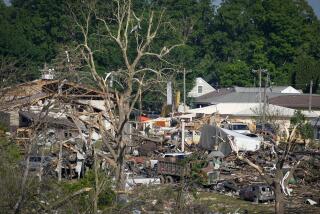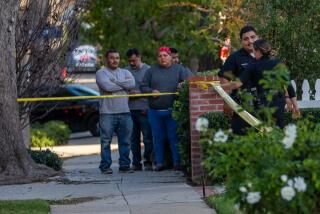‘Chicago Fire’ actress Molly Glynn killed by falling tree
Longtime Chicago theater actress Molly Glynn died Saturday, a day after she was hit by a falling tree while biking on a north suburban forest preserve trail, officials and Glynn’s husband said.
Glynn, who lived in Rogers Park, was pronounced dead at 12:45 p.m. at Evanston NorthShore Hospital, according to the Cook County medical examiner’s office. Also Saturday, Chicago actor Bernie Yvon was killed when the vehicle he was in was struck by a semi-trailer in Munster, the Chicago Tribune reports.
Glynn, 46, was riding her bike about 3 p.m. Friday with her husband, fellow theater actor Joe Foust, when the pair were caught in the fast-moving afternoon storm, Foust said in a Facebook message today. Heavy winds uprooted a tree onto the path where she was riding in Erickson Woods near Northfield, authorities said.
Foust, 45, said he and Glynn would bike frequently together. On Friday, they were riding on their favorite biking trail, the North Branch, and were about 25 miles into the ride, heading south on the trail, when the weather suddenly changed around 3 p.m. as they approached Willow Road.
“It was harsh and quick,” said Foust, who has been married to Glynn for about four years.
Glynn, who was riding behind Foust, yelled that the two should take cover. A split second later, Foust said he heard a loud crack and saw a tree fall down behind him in the rear-view mirror of his bicycle. One of the branches hit Foust’s back, but he said he is doing fine.
He said Glynn wore a helmet.
Foust said it took the forest preserve police about 20 minutes before they found them. He said he tried calling 911 several times before he could get through, likely because of weather.
He said he believed a strong wind was responsible for uprooting the tree that killed his wife.
Foust said Glynn leaves behind two teenage boys, Chance, 17, and Declan, 13.
Foust, who first met Glynn at the Chicago Shakespeare theater in 1990s, described her as funniest, greatest person he has ever met.
“We really loved working together,” he said.
Glynn over the years has been a regular at some the city’s most renowned theaters, including Steppenwolf, Writers, Next, Chicago Shakespeare and Northlight, where she appeared in “Tom Jones” last winter. Her TV credits include “Boss” on Starz and NBC’s “Chicago Fire”, in which she played an emergency room doctor.
Northlight Theatre artistic director BJ Jones called Glynn “a beautiful woman and one would think that she would only be a leading lady, but the truth is she also had great skill and breadth and scope as an actress,” all but stealing the show as one of the Pigeon sisters in the company’s 2012 production of “The Odd Couple.”
“In a cast, she was a strong, stabilizing influence,” he said. “A real pillar in the cast. And when she walked on stage, you knew you were in good hands. You knew that you were seeing the truest colors of the character and the play.”
With her thick red hair, Glynn cut an elegant figure on stage and had an affinity for inhabiting strong women with sharp edges to their personality, memorably playing a wife grappling with her husband’s extramarital affair in a 2003 Steppenwolf Garage production of “Orange Flower Water.”
Area residents said the violent thunderstorm, which likely uprooted the tree that ended Glynn’s life, came in rapidly but lasted for only about an hour.
Morton Grove resident Jim Polizos was about to hop on his bicycle around 3 p.m. on Friday to make his daily 10-mile commute from his job in Wheeling to his home when he saw the darkness outside. Polizos, who said he has driven through extreme conditions such as the polar vortex earlier this year, said he decided to wait for about half an hour instead of weathering the storm.
“It was really intense as far as the wind,” said Polizos, 28. “The rain was just whipping around. It was almost whiteout conditions.”
According to the National Weather Service, the storms that hit the north suburbs Friday afternoon blew up in gusts of 70 mph or more, with indications from several sources that there were gusts of 80 mph in some places, said Gino Izzo, a weather service meteorologist.
Strong winds hit Northbrook--near where Glynn was hit--about 2:50 p.m., with the weather service citing a member of the public as clocking wind gusts at 80 mph there, with light poles and multiple trees and branches felled by the storm.
The storm continued for some time, but by about 3:40 p.m., the weather had cleared in much of the Chicago area, and winds had died down to about 10 mph in most places, Izzo said.
Fallen trees and branches peppered the streets here and there as the only evidence of the past storm.
Glenview resident Allan Rubin, whose Glenview Cycle shop briefly lost power during the storm, said the weather was so nice during the evening his family decided to have dinner outside at around 7 p.m.
Polizos and Rubin both have ridden bicycles on the North Branch Trail, which goes through Erickson Woods where Glynn was hit. The paved trail is popular among community members because it offers a scenic route from the north side of the city to the Chicago Botanic Garden in Glencoe.
“It was just dumb luck,” Rubin said of Glynn’s death.
Deaths like Glynn’s are a rare occurrence, experts say.
Chances of being killed by a falling tree are very small, said Tom Schmidlin, a professor in the Department of Geography at Kent State University.
Annually about 25 to 35 people are killed by a falling tree or branch nationwide, said Schmidlin, who has researched the subject extensively.
According to 2008 study Schmidlin conducted, 407 people died from “wind-related tree failures” between 1995 and 2007 in the United States. Schmidlin said people are more likely to die from tornado-related causes -- another rare event. On average, about 60 fatalities are associated with tornadoes every year, he said.
He said trees in parks, forest preserves and other public areas are maintained by local jurisdictions. But he said it is hard to check the health of every tree in a large forest. In addition, a strong thunderstorm can take down even a perfectly healthy tree.
Tribune reporter Liam Ford contributed
More to Read
The complete guide to home viewing
Get Screen Gab for everything about the TV shows and streaming movies everyone’s talking about.
You may occasionally receive promotional content from the Los Angeles Times.







